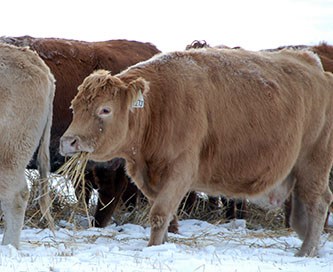As winter approaches and calves are weaned, many cow/calf producers are getting their cattle pregnancy tested. Pregnancy testing helps keep you informed about the status of your herd and helps maximize returns.
Pregnancy testing is usually performed by a veterinarian for approximately $5 per head. Veterinarians can use an ultrasound machine or rectal palpation to accurately determine if a cows is pregnant, and how far into gestation they are. This is a very quick procedure, and having a veterinarian come to your farm can help improve your working relationship, which is becoming even more important with the changes to antibiotic access that come into effect on December 1.
Being aware of how many open cattle you have can help with early detection of major issues on your farm. The average open rate is 7 per cent for cows and 10 per cent for heifers – a big change from your usual open rates could indicate an underlying problem with your bulls, nutrition program, or herd health, and will have big costs in lost production. Knowing about these issues early allows you time to address them, and prepare for the coming year.
What should you do with open cows? It depends on your farm. In years like this, where good feed is in short supply, many producers opt to sell immediately to reduce winter feeding costs. Alternatively, you could feed your open cows separately to put some weight on, and market them later to avoid the historically lower prices we are experiencing.
There are many factors to consider when making this decision, but one of the most significant is winter feeding cost: the single biggest expense for cow/calf producers. The more it will cost you to feed your open cows, the more benefit you will see in culling early. Selling sooner also reduces potential veterinary costs and labour. If you do have enough feed available, another important factor is daily gain. Putting more pounds on your cull cows before marketing them means better returns in the spring. This is best achieved by separately feeding your open cows a high-energy ration. Other things to consider when deciding how to manage your open cows include taxable income, your ability to manage separate feeding groups, as well as current and projected markets.
With so much to consider, it can be challenging to make the best decisions for your operation. Luckily, there are plenty of tools that can help:
The Beef Cattle Research Council has a web tool that compares the gain or loss per head when preg-checking and culling in the fall compared to culling in the spring. There is a basic and advanced variation of this tool – the more detailed records and information you have, the more accurate the results will be.
Manitoba Agriculture also has a fillable excel spreadsheet to help you determine the cost of overwintering your cattle.
Alberta Agriculture and Forestry’s CowBytes program helps determine the cost of your winter ration – and to formulate more precise diets while you’re at it!
The cost of pregnancy testing your cattle is negligible when compared to the potential value in managing your opens appropriately. You can’t manage what you don’t measure. Cull cows generally comprise 15 to 30 per cent of cow/calf producer income, and pregnancy testing is a key tool in managing this significant revenue.
For more information on this or other livestock related topics, please contact your local Regional Livestock and Feed Extension Specialist, call the Agriculture Knowledge Centre at 1-866-457-2377.



